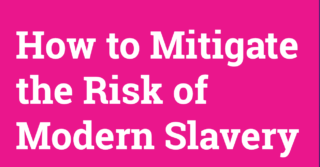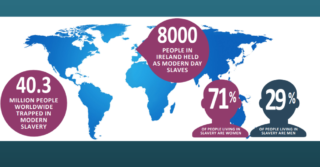Insights from Reporting the Impact of the Business on Human Rights workshop
 On May 8, our Senior CSR Adviser Darina Eades delivered a Workshop on Reporting the Impact of the Business on Human Rights. Participants were member companies and the workshop was hosted by A&L Goodbody.
On May 8, our Senior CSR Adviser Darina Eades delivered a Workshop on Reporting the Impact of the Business on Human Rights. Participants were member companies and the workshop was hosted by A&L Goodbody.
The driver of this event was the 2017 Non-Financial Reporting Legislation, applicable to public-interest entities, with more than 500 employees and a turnover of €40 million. These organisations must now disclose annually how they are respecting human rights and are seeking to be free from bribery and corruption, while striving to minimise their impact on the environment (among other requirements).
Another driver was the 2015 UK Modern Slavery Act – Modern Slavery being the term used to describe slavery, servitude, labour exploitation, forced and compulsory labour and human trafficking. This Act is relevant to companies in Ireland too because it applies to all companies who operate in any part of the UK, with a turnover of £36 million or more, regardless of where they are headquartered. Companies for whom this Act is relevant must publish a publicly accessible statement every year, on how they are seeking to mitigate any incidence of modern slavery in their operations and their supply chain.
Legislation aside however, the core purpose of this event was to give BITCI members time with companies who have been investigating these issues in their operations and supply chains for a number of years.
Sustainability leaders from CRH, Accenture, Marks & Spencer, Shif share how they conduct risk-based human rights due diligence
Our guest speakers were Richard Frost of CRH plc, Head of Sustainability, Innovation & Risk, CRH Procurement; Mary Keays of Accenture, UK & Ireland Procurement Lead; Louise Nicholls of Marks & Spencer, Corporate Head of Human Rights, Food Sustainability & Food Packaging; and Mairead Keigher of Shift, Reporting Programme Manager.
As part of the brief, our corporate speakers were asked to share how they conduct risk-based human rights due diligence; to share some of the challenges they’ve encountered; the kinds of infringements their investigations have unearthed and the kinds of actions these companies have been able to take in response. Mairead Keigher from Shift provided details of the UN Guiding Principles Reporting Framework.
Chatham House Rules were observed for the sharing of information and the discussion, but key points that can be shared include the following:
Key insights from Richard Frost Head of Sustainability, Innovation & Risk, CRH Procurement
For Richard Frost of CRH plc, with 148,000 suppliers, transparency is key. It is imperative that the company is able to demonstrate that human rights due diligence has been conducted every step of the way. CRH began their human rights journey by mapping their supply chain, identifying the key risks for everything purchased, and from there it was possible to see where the biggest impact could be made utilising CRH’s buying power and leverage. Richard says that in latter years, it is interesting to see how quality assurance and the principles of sustainability have become of increasing importance to clients, sometimes even more than price.
CRH has given considerable attention to raising awareness internally on the breadth of the human rights agenda and recognises it has much more to do, with the key to success being cross-functional involvement. Richard recommends involving all in procurement as early as possible, to understand the various potential issues, at every one of the supply chain tiers.
CRH is now working with their suppliers in higher risk countries. As part of this activity, due diligence workshops are sometimes held to build the capability of suppliers. Multiple site visits are also conducted to ensure that minimum standards are being worked to and corrective action plans are in place before trading commences There are many indicators and red flags that indicate risk of modern slavery and these include breaches on safety and environmental compliance, and if the minimum wage isn’t paid. The benefits for CRH plc in conducting human rights due diligence include reduced risk, increased innovation and increased collaboration.
According to Richard, “By integrating CSR requirements at the start of a tender stage, we are able to mitigate risks more effectively than after the event. Sustainability and innovation are increasingly linked & often lead to lower total cost of operation solutions. Responsible sourcing creates a critical narrative that can demonstrate trust and deeper relationships with customers and suppliers”.
CRH plc’s Modern Slavery Statement and their Sustainability Report are available at www.crh.com
Mary Keays Procurement Lead at Accenture UK & Ireland
Mary Keays of Accenture described their use of their Supplier Standards of Conduct, Supplier Selection Process, Supplier Code of Business Ethics & Supplier Governance. Accenture follows robust processes to assess human rights, ethical and environmental risks when sourcing suppliers. Accenture Request For Proposal (RFP) templates have been updated with modern slavery and human rights questions. New Accenture suppliers in the UK must provide detailed information about their human rights policies, processes and risk assessments, including the prevention of slavery and human trafficking within their own organisation and supply chains.
In addition, Accenture has commissioned a specialist global firm to provide a continuous monitoring service whereby Accenture is notified of any credible report of supplier engagement in human trafficking or other prohibited activities.
Accenture has conducted living wage reviews in 10 key countries, reviewing wage levels of over 36,000 managed contractors provided by external vendors. Outside the UK and Ireland, Accenture developed both country and location-specific points of view using a range of external and internal reference and data points (e.g. publications on living wage, cost-of-living information, internal and external salary benchmarks). The review confirmed the vast majority of managed contractors already received a living wage. Discrepancies were found in fewer than 2% of cases and these have since been remediated.
In 2018, Accenture started a new Supplier Engagement Initiative – a Human Rights & Modern Slavery Workshop – to enable global suppliers and partners to meet with industry experts for guidance and best practice sharing. Business in the Community Ireland is delighted to be involved with this initiative.
Accenture’s latest Modern Slavery Statement & their Corporate Citizenship Report are available from www.accenture.com
Louise Nicholls Corporate Head of Human Rights, Food Sustainability & Food Packaging at Marks & Spencer
Louise Nicholls from Marks & Spencer talked about the importance of senior leaders being committed to ensuring human rights are upheld across company operations and the supply chain. That the example provided by leaders, accompanied by a good Governance structure (that includes champions in every area) paves the way for cross-company buy-in.
Interestingly, Louise says it is worth examining the history of the company to identify noted examples of where human rights and the upholding of business ethics have been an area of focus, and to build on core principles where they are in place.
For Louise, a detailed Human Rights Risk Assessment is a vital piece of work to undertake, alongside the examination of the root causes of the salient issues (the potentially most negative risks to people, arising from company activities). Marks & Spencer has worked in tandem with suppliers and other partners to co-create solutions to shared challenges and Louise says this has served the business very well. Once the key risks have been identified, a strategy on human rights is required, with key objectives and measurable targets.
Marks & Spencer has published a stand-alone Human Rights Impact Report, where they disclose their objectives and targets. They were also the first company in their sector to publish an Interactive Supplier Map where all can view M&S Tier 1 Suppliers by type (Clothing, Home, Beauty & Food) and location in the world (including the suppliers’ street address, numbers employed, the gender ratio and if they have union representation). Details are available for 67 countries and 1720 factories. The leadership approach of M&S in Human Rights has been recognised by the Corporate Human Rights Benchmark as the Top Apparel Performer, globally. Marks & Spencer’s latest Modern Slavery Statement, their Sustainability Report, their Human Rights Report and their Interactive Supplier Map are available at https://corporate.marksandspencer.com
Mairead Keigher Reporting Programme Manager at Shift
Shift is the centre of expertise on the UN Guiding Principles on Business and Human Rights and Mairead Keigher, Reporting Programme Manager, shared some of the findings from research Shift has conducted on Human Rights Reporting.
Of a sample of 150 of the world’s largest companies, Mairead said more than 50% lack a clear explanation of their salient, or most severe, human rights risks. 45% lack clarity on their day to day management of human rights and 16% say nothing at all about their governance of human rights, sustainability or CSR.
Shift is also a member of the Alliance for Corporate Transparency[1], working on a three year project to review and analyse the non-financial reports of 1000 companies across the EU. The focus of the 2018 pilot (105 companies) was on Energy & Resource Extraction, ICT & Healthcare companies. According to Mairead, while 90% of companies express a commitment in their report to respect human rights, only 36% describe how they are conducting due diligence; only 10% disclose their management of the issues.
Mairead then outlined the usefulness of the UN Guiding Principles Reporting Framework (based on the UN Guiding Principles on Human Rights). This Framework provides a short set of questions for all companies to answer, that examine if business is being done with respect for human rights and how to show progress being made. Details are at: https://www.ungpreporting.org/framework-guidance/
Attendees of the Workshop on May 8 were then given time to discuss all they had heard, and to consider the point in the journey their company is at regarding the integration of a human rights lens into company operations and the supply chain.
The key benefits for attendees included:
- Superb speakers with the right knowledge – so many learnings.
- Broader understanding of the scope of Human Rights. ” I loved the peer learning and the opportunity to have open conversation during the break-outs”
- Practical insights into how different companies are taking action this area.
- Resources shared by BITCI, the Case Studies and identifying the next steps to developing a Human Rights Report.
BITCI Support
BITCI Member Companies have access to support with the development of their Human Rights Policy, Supplier Code of Conduct, Training on How to Conduct Risk-Based Due Diligence, Internal Awareness-Raising, Supplier Engagement & Reporting.
For more information please contact Darina Eades, Senior Adviser on Corporate Responsibility at deades@bitc.ie
[1] The Alliance for Corporate Transparency has analysed how European companies disclose information necessary for understanding their impact on society and the environment, as required by the EU Non-financial Reporting Directive. See https://www.allianceforcorporatetransparency.org/news/companies-failing.html






